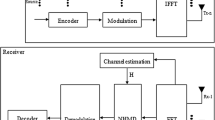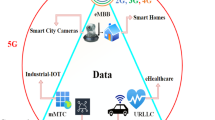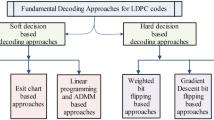Abstract
Maximum number of users in a Code Division Multiple Access (CDMA) system, disregarding the type of used signature sequences, is equal to the processing gain; but in overloaded CDMA systems, it is tried to use some special methods of applying signature sequences so that the number of users exceeds the processing gain of the system. This growth in capacity is gain at the cost of decrease in performance of the conventional systems; and usually it is tried to use channel coding methods or multi-user detectors to compensate this decrease. Because of advantages of using coding methods joined with multiuser detectors in achieving better performance and also because of some benefits of using (Low Density Parity Check) LDPC method in comparison with similar capacity achieving coding methods, in this article, an iterative multi-user detector for an overloaded LDPC Coded CDMA system is proposed. This receiver consists of a combination of matched filters in the first stage and a linear (Minimum Mean Square Error) MMSE detector and an Interference Cancellation (IC) scheme in the successive stages. In the suggested method, a bank of LDPC decoders gives the soft information to the IC blocks, which help for the better interference cancellation. Comparing the performance of the proposed system with that of Turbo coded system shows that the proposed system, in addition to advantages of using LDPC codes instead of Turbo codes, has better bit error rate performance.
Similar content being viewed by others
Abbreviations
- PG:
-
Processing gain
- N :
-
Number of users
- G :
-
Generator matrix
- H :
-
Parity check matrix
- x :
-
Information matrix
- c :
-
Code vector
- r(t):
-
Received signal
- T b :
-
Bit Period
- A k :
-
Received amplitude of kth user
- C k (i):
-
Transmitted bit by kth user in ith bit period
- p(t):
-
Rectangular pulse with power 1 and period T b
- S k (t):
-
Spreading sequence with unit power for the kth user
- n(t):
-
Additive white Gaussian noise
- σ 2 :
-
Double sided spectrum density of white Gaussian noise
- Y k :
-
Output of the kth matched filter
- ρ jk :
-
Normalized correlation factor between the ith and jth users’ signature sequences
- n k :
-
Gaussian zero mean random variable with variance of σ 2
- L ap :
-
A-priori log-likelihood ratio
- \({\tilde {Y}_k (i)}\) :
-
Soft output of IC module
- \({\hat{{c}}_j^{(m)}}\) :
-
Estimation of c j in the mth iteration
- \({{\bf L}_{{\rm ex}}^{(m-1)}}\) :
-
Extrinsic information
- \({z_k^{(m)}}\) :
-
kth signal after the mth iteration of IC
- \({\tilde {{\bf n}}_k }\) :
-
Gaussian zero mean random variable
- A :
-
Diagonal matrix of received amplitudes
- R :
-
Cross correlation matrix
- T :
-
Equals to the product M*R
- \({\hat{{\bf b}}}\) :
-
Output of detector
- M :
-
MMSE filter
- SNR:
-
Signal to noise ratio
References
Proakis J. G. (1995) Digital communications. 3rd ed. Mc-Graw-Hill, New York
Sari, H., Vanhaverbeke, F., & Moeneclaey, M. (1999). Increasing the capacity of CDMA using hybrid spreading sequences and iterative multistage detection. In Proceedings of IEEE vehicular technology conference (VTC), Houston, TX, Fall, 1160–1164.
Shi, Z., & Schlegel, C. (2006). Iterative multiuser detection and error control code decoding in random CDMA. IEEE Transactions on Signal Processing 54(5).
Boutros J., Caire G. (2002) Iterative multiuser joint decoding: Unified framework and asymptotic analysis. IEEE Transactions on Information Theory 48(7): 1772–1793
Berrou C., Glavieux A. (1996) Near Optimum error correcting coding and decoding turbo-codes. IEEE Transactions on Communications 44: 1261–1271
Schlegel, C., Truhachev, D., & Krzymien, L. (April, 2006). Iterative multiuser detection of random CDMA using partitioned spreading. In Proceedings of 4th international symposium on turbo codes and related topics, Munich, Germany.
Lin S., Costello D. J. (2004) Error control coding fundamentals and applications. 2nd ed. Prentice Hall, New Jersy
Fagervik, K., & Larssen, A. S. (2003). Performance and complexity comparison of low density parity check codes and turbo codes. In norwegian signal processing symposium.
Verdú S. (1986) Minimum probability of error for asynchronous gaussian multipleaccess channels. IEEE Transactions on Information Theory IT-32(1): 85–96
Lupas R., Verdú S. (1990) Near-far resistance of multiuser detectors in asynchronous channels. IEEE Transactions on Communications 38(4): 496–508
Xie Z., Short R. T., Rushforth C. K. (1990) A family of suboptimum detectors for coherent multiuser communications. IEEE Journal of Selected Areas Communications 8(4): 683–690
Lu, R. C. Y. (2004). Multiuser detection in CDMA MIMO systems with timing mismatch. M.S. thesis. Queen’s university, Kingston, Ontario, Canada.
Romano, G., Palmieri, F., Willett, P. K., & Mattera, D. (Mar, 2006). Asymptotic multiuser efficiency in overloaded CDMA. In proceedings of conference on information sciences and systems(CISS), Priceton, USA.
Kapur A., Varanasi M. K. (July, 2003) Multiuser detection for overloaded CDMA systems. IEEE Transactions on Information Theory 49(7): 1728–1742
El Gamal, H., & Geraniotis, E. Iterative multiuser detection for coded CD
MA Signals in AWGN and fading channels. IEEE Journal of Selected Areas Communications, 18:(1):30-41, Jan. 2000.
Morosi S., Fantacci R., Del Re E., Chiassai A. (2007) Design of Turbo-MUD receivers for overloaded CDMA systems by density evolution technique. IEEE Transactions on Wireless Communications 6(10): 3552–3556
Verdu S., Shamai S. (1999) Spectral Efficiency of CDMA with Random Spreading. IEEE Transactions on Information Theory 45(2): 640–662
Sun J. (June, 2003). An introduction to low density parity check (LDPC) codes. Wireless Communication Research Laboratory(WCRL). Lane Dept. of Comp. Sci. and Elec. Engr., West Virginia University.
Leiner B. M. J. (2005). LDPC Codes—a brief tutorial bernhard. April 8.
Qin Z., Teh C. (2006) Iterative reduced-complexity multiuser detection based on chase decoding for synchronous turbo-coded CDMA system. IEEE Journal of Selected Areas Communications 24(1): 200–208
Yue G., Wang X. (2004) Coding-spreading tradeoff in LDPC-coded CDMA with turbo multiuser detection. IEEE Transactions on Wireless Communications 3(5): 1734–1745
Wang X., Yue G., Narayanan K. R. (2005) Optimization of LDPC-coded turbo CDMA systems. IEEE Transactions on Signal Processing 53(4): 1500–1510
Tarable A., Montorsi G., Benedetto S. (2005) A linear front end for iterative soft interference cancellation and decoding in coded CDMA. IEEE Transactions on Wireless Communications 4(2): 507–518
Author information
Authors and Affiliations
Corresponding author
Rights and permissions
About this article
Cite this article
Azmi, P., Shojaee Zand, T. An Iterative Multiuser Detector for Overloaded LDPC Coded CDMA Systems. Wireless Pers Commun 66, 41–56 (2012). https://doi.org/10.1007/s11277-011-0324-5
Published:
Issue Date:
DOI: https://doi.org/10.1007/s11277-011-0324-5




